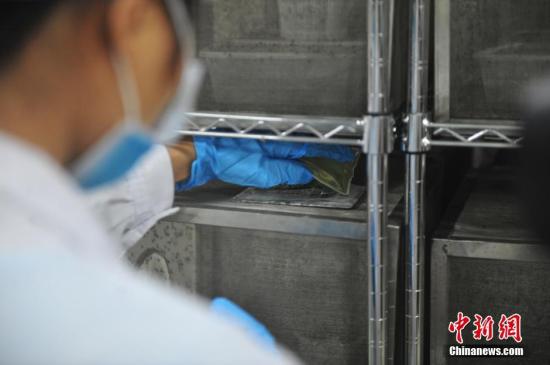China News Service, June 10, according to the British "The Sun" reported on the 8th, in order to prevent the spread of malaria and other diseases, the laboratory mutated mosquitoes will be released in Florida and Texas this summer. But scientists are worried about the lack of supervision of this plan.
Data figure: Laboratory technicians use animal blood to breed mosquitoes. China News Agency reporter Huang Zhuoxian
The genetically modified mosquitoes bred by British biotechnology company Oxitec will mate with local common mosquitoes to kill or reduce their numbers.
Although this technology has shown good prospects in experiments, experts warn that this plan may encounter terrible mistakes in field practice.
"This strategy has considerable potential benefits for hundreds of millions of people affected by mosquito-borne diseases every year." A group of scientists and ethicists said: "However, we are concerned that the current government supervision and science of genetically modified mosquitoes Evaluations cannot ensure that they are deployed responsibly."
In May 2020, the US Environmental Protection Agency approved Oxitec's controversial plan to conduct "experiments" in Florida and Texas. Starting in the summer, the authorities will release millions of genetically modified male mosquitoes every week for the next two years. "USA Today" reported that measures to release genetically modified mosquitoes in Florida and Texas still require local government approval.
When laboratory-grown mosquitoes are released and mate with wild female mosquitoes, their female offspring die. Since only female mosquitoes will bite, this means that male mosquitoes bred by Oxitec will not spread the disease to humans. Over time, large numbers and repeated releases of genetically modified mosquitoes will cause a temporary collapse of wild populations.
Due to climate change, the number of mosquitoes in South America has increased. Malaria and other mosquito-borne diseases are showing an upward trend in the southern United States.
Oxitec has previously been in dispute. In Brazil, after millions of genetically modified mosquitoes were released, the effect was counterproductive. Some scientists believe that the project inadvertently created a super-resistant mosquito that is more difficult to kill than before.
Oxitec's work has been severely criticized by the charitable organization "Friends of the Earth" dedicated to protecting the environment. As early as 2012, Eric Hoffman of "Friends of the Earth" said: "The mosquito test cannot be continued without a comprehensive and fair assessment of environmental, human health and ethical risks."
The "Friends of the Earth" statement stated that Oxitec was widely criticized for placing commercial interests above public and environmental safety. The first batch of genetically modified mosquitoes was released in the Cayman Islands without biosecurity laws or regulations, which caused controversy.
The statement also stated: "Oxitec staff has been closely involved in the development of global genetically modified insect risk assessment guidelines, which has raised concerns about the lack of independent review and conflicts of interest."

